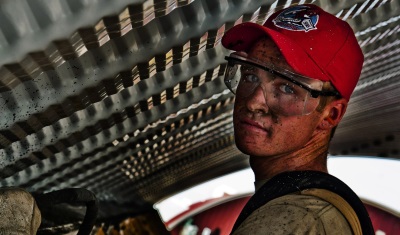See the most important skills you need for construction careers, with examples. Plus: get a breakdown of which skills you need to become a construction worker, architect or building surveyor.
There are many ways into a career in construction. With all the varied roles on offer, you could be heading in through a construction apprenticeship or degree to either work in the office or on-site. It doesn’t matter what your background or career goals are – these are the top five skills you need to impress your employer when writing your CV or heading into a construction interview.
1. Communication
Communication is one of the most important skills you can have in a construction career. You don’t have to be the Archbiship of Banterbury! Honest and speedy communication is great for building a good team atmosphere, spotting and solving problems, and essentially saving the employer money so a construction project can get done on time and on budget.
2. Problem solving
Any construction job involves problem solving skills. There’s always going to be a challenge to overcome, or an issue to break down into small chunks so you can find a solution without getting overwhelmed. If contractors haven’t met their end of the bargain, or a load of heavy materials has been delivered to the wrong place, that’s a problem that needs logic and a cool head to solve.
Whether you’re a site manager or a plumber, you’ll be faced with situations where you know something isn’t how it should be. You won’t panic, run away or file the issue under ‘someone else’s problem’. You won’t get defensive and try to play the blame game, either. You’ll use your critical reasoning skills to spot the problem, think about why it’s not working, and find ways to get round it.
In construction, problems that’ aren’t dealt with could mean a project overruns or the quality of the final construction is poor. If it’s a health and safety issue, it could mean that someone’s life will be on the line. A calm, proactive approach to problem solving is really important in any construction job.
3. Self-belief
Self-belief doesn’t mean having a big head or being arrogant – that doesn’t fit well with teamwork, which is another important skill. The top three elements of self-belief are:
- Motivation
- Resilience
- Positive attitude
If you’re motivated to take positive action, it shines through. You’ll turn up to work on time, you’ll suggest useful ways of doing things on-site, and you won’t back down from a challenge. The public perception is that ‘cowboy builders’ slack off on the job, so your motivation helps your employer have a great reputation for how their team handles projects.
This can-do spirit is all part of having a positive attitude, and that’s also an important skill to have in a construction career. You might be born with a positive attitude, but it’s something you can build on, too. Having a positive attitude is about seeing the good in things, doing your best at work, helping to create a good team atmosphere, and taking responsibility for your actions.
The final part of self-belief is resilience. Maybe you’ve not heard of this one before, but resilience basically means that when you’re down, you get back up again. You don’t give up. If you fail, you think how you could improve next time. If you make a mistake, you own up to it so the work can carry on smoothly, and you learn from it. Whether you’re working on-site or in the office, you’ll slip up at some point, because everyone always does. There’s no shame in it. It’s how you handle it and grow from the experience that matters.
4. Self-management
Can you work like the boss is watching you… even when there are no managers around? Self-management includes things like organisation skills and taking the initiative to work safely without someone standing over you all the time.
If you’re a construction worker, you need to be organised about where your equipment and tools are, and how they’re cared for and handled. It really speeds up the job and could have a surprisingly big impact on the business, like ensuring projects are completed by the deadline. In addition, you’ll be organised in that you’ll have great timekeeping skills and make it to work on time – and not be the one whose breaks last twice as long as they should.
If you’re something like a building surveyor or architect, so much of what you do is based on great organisation. From accuracy in drawing up detailed plans to awareness of budget constraints, you’ll stay on top of all the factors involved in your work by keeping track of issues and things to do, whether it’s through archived emails and personal planning or taking notes at meetings and taking the initiative to follow up clients.
5. Teamwork
You know what they say? Construction is a team effort. You’re rarely working completely working on your own. Construction workers operate in teams. Building quality inspectors work closely with contractors, civil engineers and surveyors so that everyone knows the latest updates on the project. You will find a construction career easier to build on if you can work well with others. That means taking direction from your manager without a fuss, doing your best on the job to not let your team mates down, and generally being sociable so everyone has a smooth working day that’s smiles as well as hard work.
In construction, teamwork is also important in terms of health and safety. If you’re a scaffolder, construction workers rely on you to do their own jobs safely. Teamwork matters. Rome wasn’t built in a day – and it wasn’t built by just one person, either.
Start building these life and work skills for free with Young Professional training from Youth Employment UK.
Additional skills needed for construction worker jobs
- Physical strength and endurance
- Building/mechanical knowhow
- Basic maths, language and writing skills
- Willing to learn new ways of doing things (e.g. with technological advances in construction)
See more on how to become a construction worker
Additional skills needed for architect jobs
- Design skills
- Understanding of maths and engineering
- IT and digital skills
- Knowledge of building laws
- Knowledge of building, architectural and zoning codes
- Head for business
See more on how to become an architect
Additional skills needed for building surveyor jobs
- Technical skills
- Understanding of the building process
- Knowledge of planning and environmental legislation and building regulations
- Negotiation skills
- IT and digital skills (e.g. knowledge of computer-aided design or CAD)
- A second language (if working overseas for international clients)
See more on how to become a building surveyor
















